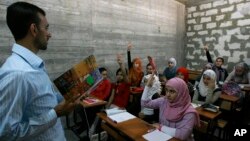Nearly three years after Taliban gunmen shot Pakistani schoolgirl Malala Yousafzai, the teenage activist challenged world leaders at the United Nations to help millions more children go to school.
Her call last week came ahead of World Teachers' Day on October 5, a UNESCO initiative highlighting the work of educators struggling to teach children amid intimidation in Pakistan, conflict in Syria or poverty in Vietnam.
Around 120 million children are out of school and a further 250 million are illiterate despite attending school, the World Bank said in May.
But there have been some improvements.
The number of children not attending primary school has plummeted to an estimated 57 million worldwide in 2015, the U.N. says. Fifteen years ago, when the Millennium Development Goals called for universal primary school education, 100 million children were out of primary school.
Sub-Saharan Africa has the largest number of children out of school, although enrollment is increasing.
Worldwide, the number of schools is growing rapidly – both private schools for the middle class and wealthy and cash-strapped government schools in places like Kenya, where poorly paid teachers are striking to demand more pay.
Many schools lack teachers, chairs, electricity or books. Others even lack buildings.
But children seem willing to learn anywhere. Classes are in corridors in the Philippines, on board boats in Brazil, and under the searing sun in Afghanistan.





